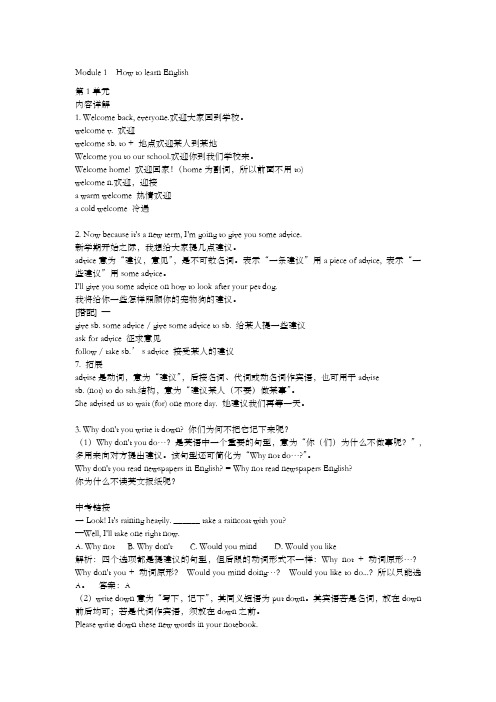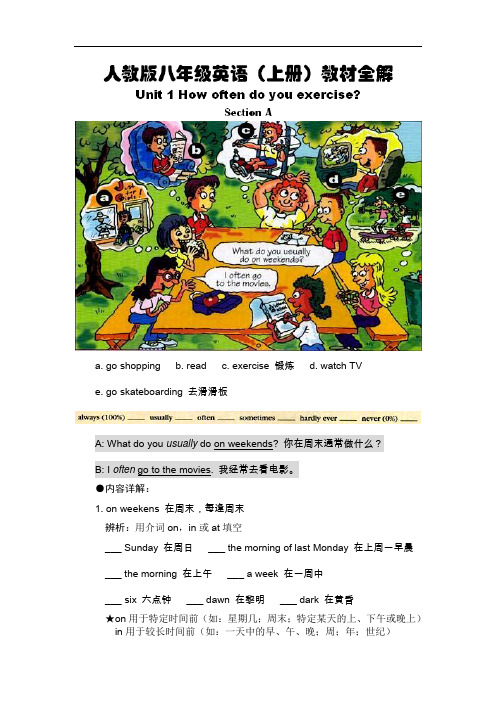人教版英语八年级上册全册教材全解
中学教材全解八年级英语(上)

Module 1 How to learn English第1单元内容详解1. Welcome back, everyone.欢迎大家回到学校。
welcome v. 欢迎welcome sb. to + 地点欢迎某人到某地Welcome you to our school.欢迎你到我们学校来。
Welcome home! 欢迎回家!(home为副词,所以前面不用to)welcome n.欢迎,迎接a warm welcome 热情欢迎a cold welcome 冷遇2. Now because it's a new term, I'm going to give you some advice.新学期开始之际,我想给大家提几点建议。
advice意为“建议,意见”,是不可数名词。
表示“一条建议”用a piece of advice, 表示“一些建议”用some advice。
I'll give you some advice on how to look after your pet dog.我将给你一些怎样照顾你的宠物狗的建议。
[搭配] —give sb. some advice / give some advice to sb. 给某人提一些建议ask for advice 征求意见follow / take sb.’ s advice 接受某人的建议7. 拓展advise是动词,意为“建议”,后接名词、代词或动名词作宾语,也可用于advisesb. (not) to do sth.结构,意为“建议某人(不要)做某事”。
She advised us to wait (for) one more day. 她建议我们再等一天。
3. Why don't you write it down? 你们为何不把它记下来呢?(1)Why don't you do…?是英语中一个重要的句型,意为“你(们)为什么不做事呢?”,多用来向对方提出建议。
人教版英语八年级上册 Unit 6 I‘m going to study computer science 教材全解及单元测试卷

人教版英语八年级上册Unit 6 I’m going to study computer science教材全解及单元测试卷【教材内容解析】Section A1.cook (P. 41)cook此处用作名词,表示“厨师”,cooker意为“厨具”。
I want to be a cook when I grow up.The cook is cooking food with the new cooker.2.What do you want to be when you grow up? (P. 41)(1) want表示“想要”时,为及物动词,后接不定式作宾语或者用于句型“want sb. to do sth.”中,表示“想要某人做某事”。
They don’t want to throw away the old furniture.She wants her parents to pay for the car.(2)when意为“当……时候”,引导时间状语从句,主句一般用将来时,从句用一般现在时表示将来。
When I arrive, I will call you.(3)grow up意为“长大、成熟”。
I grew up in Beijing.3.I’m going to practice basketball every day. (P. 41)practice用作及物动词,表示“练习、训练”,后接名词或者动名词作宾语。
The girl is practising playing the piano in the room.4.The Old Man and the Sea by Hemingway. (P. 42)by此处用作介词,表示“由……创作”。
I read a short story by Lu Xun.5.Well, I’m going to keep on writing stories, of course.(P. 42)keep on doing sth.意为“继续做某事”。
中学教材全解八年级英语上

Module 1 How to learn English第1单元内容详解1. Welcome back, everyone.欢迎大家回到学校。
welcome v. 欢迎welcome sb. to + 地点欢迎某人到某地Welcome you to our school.欢迎你到我们学校来。
Welcome home! 欢迎回家!(home为副词,所以前面不用to)welcome n.欢迎,迎接a warm welcome 热情欢迎a cold welcome 冷遇2. Now because it's a new term, I'm going to give you some advice.新学期开始之际,我想给大家提几点建议。
advice意为“建议,意见”,是不可数名词。
表示“一条建议”用a piece of advice, 表示“一些建议”用some advice。
I'll give you some advice on how to look after your pet dog.我将给你一些怎样照顾你的宠物狗的建议。
[搭配] —give sb. some advice / give some advice to sb. 给某人提一些建议ask for advice 征求意见follow / take sb.’ s advice 接受某人的建议7. 拓展advise是动词,意为“建议”,后接名词、代词或动名词作宾语,也可用于advisesb. (not) to do sth.结构,意为“建议某人(不要)做某事”。
She advised us to wait (for) one more day. 她建议我们再等一天。
3. Why don't you write it down? 你们为何不把它记下来呢?(1)Why don't you do…?是英语中一个重要的句型,意为“你(们)为什么不做事呢?”,多用来向对方提出建议。
最新人教版八年级英语(上)教材全解Unit1-3名师优秀教案

a. go shoppingb. readc. exercise 锻炼d. watch TVe. go skateboarding 去滑滑板●内容详解:1. on weekens 在周末,每逢周末辨析:用介词on,in或at填空___ Sunday 在周日___ the morning of last Monday 在上周一早晨___ the morning 在上午___ a week 在一周中___ six 六点钟___ dawn 在黎明___ dark 在黄昏★on用于特定时间前(如:星期几;周末;特定某天的上、下午或晚上)in用于较长时间前(如:一天中的早、午、晚;周;年;世纪)at用于具体时刻(如:点钟、黎明、黄昏、午夜midnight)★答案:on;on;in;in;at;at;at2. go to the movies 去看电影★其他说法:go to the cinema和go to see a film3.句型:What+助动词(do/does)+sb.+do?Sb.+频率副词+do/does sth.★一般现在时表示经常性、习惯性的动作或存在的状态。
主句是非第三人称单数时,谓语动词用原形;主语是第三人称单数时,谓语动词要在词尾加-s或-es。
例句:A: What does she usually do on weekends?B: She often goes to the movies.请将以下句子翻译成英语:小明周末通常做什么?他经常在周末打篮球。
她总是在周末购物。
张强很少在周末锻炼。
我有时在周末读书。
他从来不在星期一看电视。
答案:What does Xiao Ming usually do on weekends?He often plays basketball on weekends.She always goes shopping on weekends.Zhang Qiang hardly ever exercises on weekends.I sometimes read on weekends. / I read on weekends sometimes. /Sometimes I read on weekends.He never watches TV on Monday.4.频率副词:表示频率的副词(短语)通常用于一般现在时或一般过去时(过去的某段时间里做某事的频率)的句子里,频率副词(短语)常放在行为动词之前,系动词、情态动词或助动词之后。
人教版英语八年级上册Unit5Doyouwanttowatchagameshow教材全解

人教版英语八年级上册Unit 5 Do you want to watch a game show?教材全解【教材内容解析】Section A1.What do you think of talk shows? (P. 33)show用作可数名词,意为“节目”,talk show表示“访谈节目”。
He is a talk show host.What’s your favourite TV show?【拓展】show用作名词,还可以表示“展览、表演”,on show表示“在展览中”,另外,show还可以用作及物动词,表示“给……看、展示”。
Some famous paintings are on show now.Can you show your new phone to me?2.I don’t mind them. (P. 33)① mind doing sth. 介意做某事Would you mind opening the window please?② mind sb’s/sb doing sth. 介意某人做某事Do you mind my/me calling you at night?3.news (P. 33)news用作不可数名词,表示“新闻”,a piece of news表示“一则新闻”,news在句中作主语时,谓语动词用单数形式。
The news makes the children excited.No news is good news.4.can’t stand (P. 33)stand此处用作及物动词,表示“忍受”,用于否定句和疑问句中,can’t/couldn’t stand doing sth.“不能忍受做某事”。
I can't stand the bad weather.He can’t stand living here any longer.5.Then let’s watch a talk show. (P. 33)(1) let作使役动词,意为“允许、让”,let sb. (not) do sth.“让某人做某事”。
新人教版新目标初中英语八年级上册教材全解读

新人教版新目标初中英语八年级上册教材全解读新人教版新目标初中英语八年级上册教材全解读教材分析首先,我简要的谈一下教材的结构和内容:上册共10个单元,每个单元又分为三部分:Section A, Section B, Self-check。
并且各有侧重点。
其中Section A 包括单元的重点词汇,用语法聚焦框来呈现语法例句,总结本单元的语法点,任务型的听力练习,用结伴对话来进行互动活动,学生在互相合作中使用目标语言来完成本部分的学习。
Section B在循环section A 所呈现的语言的同时引出新的词汇;以活动帮助学生整合新的目标语言和前面学过的语言。
主要包含词汇拓展,新旧语言知识综合运用,阅读,同步写作练习等。
Self-check 复习所有重点词汇以及新学的语法项目;以图片方式进一步应用了本课的目标语言。
这部分主要包括词汇知识的评价,语言应用知识。
本册语法知识比较多,主要包括对一般现在时的巩固复习,形容词和副词的比较级和最高级,现在进行时表示将来,一般将来时,一般过去时,以及情态动词的用法。
学生对这些语法现象和语法知识有了一个系统的了解和掌握,基本做到了学以致用。
新教材的一个最大的特色是采用了“以学生为中心”的教学理念,每个单元的教材设计都采用任务型语言教学模式,融会话题,交际功能和语言结构,形成了一套循序渐进的生活化的学习程序。
其次,新教材在生活化的基础上,进一步强化自主学习。
倡导活动性语言输入,在活动中训练英语听,说,读,写四大技能。
并强调课堂上师生互动。
新教材强调教师要改变过去课堂上老师主讲,学生被动学习的方式。
教师课堂上主要是组织引导学生通过听、说、读、写、唱、游、演、画、做等形式让学生讲英语、用英语、用英语思考,用英语交流,用英语来获取信息和传递信息。
学生学习中碰到问题,老师应引导学生自己讨论、分析、辨别、而不是老师直接给答案,以达到真正把学生能力培养出来的目的。
再次,新教材能够很好的培养学生的正确的、与时俱进的情感态度价值观,所选的教材话题都能很好的体现新时代青少年的精神风貌。
人教版英语八年级上册Unit5Doyouwanttowatchagameshow教材全解

人教版英语八年级上册Unit 5 Do you want to watch a game show?教材全解【教材内容解析】Section A1.What do you think of talk shows? (P. 33)show用作可数名词,意为“节目”,talk show表示“访谈节目”。
He is a talk show host.What’s your favourite TV show?【拓展】show用作名词,还能够表示“展览、演出”,on show表示“在展览中”,另外,show 还能够用作及物动词,表示“给……看、展现”。
Some famous paintings are on show now.Can you show your new phone to me?2.I don’t mind them. (P. 33)① mind doing sth. 介怀做某事Would you mind opening the window please?② mind sb’s/sb doing sth. 介怀某人做某事Do you mind my/me calling you at night?3.news (P. 33)news用作不可数名词,表示“新闻”,a piece of news表示“一那么新闻”,news在句中作主语时,谓语动词用单数形式。
The news makes the children excited.No news is good news.4.can’t stand (P. 33)stand此处用作及物动词,表示“忍受”,用于否定句和疑问句中,can’t/couldn’t stand doing sth.“不能忍受做某事”。
I can't stand the bad weather.He can’t stand living here any longer.5.Then let’s watch a talk show. (P. 33)(1) let作使役动词,意为“许诺、让”,let sb. (not) do sth.“让某人做某事”。
中学教材全解八年级英语上

中学教材全解八年级英语上Document number【980KGB-6898YT-769T8CB-246UT-18GG08】Module 1 How to learn English第1单元内容详解1. Welcome back, everyone.欢迎大家回到学校。
welcome v. 欢迎welcome sb. to + 地点欢迎某人到某地Welcome you to our school.欢迎你到我们学校来。
Welcome home! 欢迎回家!(home为副词,所以前面不用to)welcome n.欢迎,迎接a warm welcome 热情欢迎a cold welcome 冷遇2. Now because it's a new term, I'm going to give you some advice.新学期开始之际,我想给大家提几点建议。
advice意为“建议,意见”,是不可数名词。
表示“一条建议”用a piece of advice, 表示“一些建议”用some advice。
I'll give you some advice on how to look after your pet dog.我将给你一些怎样照顾你的宠物狗的建议。
[搭配] —give sb. some advice / give some advice to sb. 给某人提一些建议ask for advice 征求意见follow / take sb.’ s advice 接受某人的建议7. 拓展advise是动词,意为“建议”,后接名词、代词或动名词作宾语,也可用于advisesb. (not) to do sth.结构,意为“建议某人(不要)做某事”。
She advised us to wait (for) one more day. 她建议我们再等一天。
3. Why don't you write it down 你们为何不把它记下来呢(1)Why don't you do…是英语中一个重要的句型,意为“你(们)为什么不做事呢”,多用来向对方提出建议。
- 1、下载文档前请自行甄别文档内容的完整性,平台不提供额外的编辑、内容补充、找答案等附加服务。
- 2、"仅部分预览"的文档,不可在线预览部分如存在完整性等问题,可反馈申请退款(可完整预览的文档不适用该条件!)。
- 3、如文档侵犯您的权益,请联系客服反馈,我们会尽快为您处理(人工客服工作时间:9:00-18:30)。
人教版英语八年级上册 Unit 10 If you go to the party, you'll have a great time!教材全解
【教材内容解析】 Section A 1. If you go to the party, you’ll have a great time. (P. 73) have a great time意为“过得愉快、玩得开心”,相当于enjoy oneself或者have fun。 They are having a great time in the park. =They are enjoying themselves in the park. 2. The students are talking about when to have a class party/a class
meeting/a birthday party. (P. 74)
have a class meeting意为“开班会”。 We will have a class meeting next week. 3. What will Mark organize (P. 74) organize用作及物动词,表示“组织、安排”,后接表示组织、活动类的名词做宾语,名词形式为organization表示“组织”。 Last month, we organized a party. 4. ...let’s order food from a restaurant. (P. 74) order此处表示“订购、点菜”,order sth. from...表示“从……订购某物”。 I ordered some chicken from that shop. 【拓展】order还可以作及物动词,意为“命令”,表示“命令”时,常用于order sb. (not) to do sth.结构中 The police ordered him to wait right here. 5. If we ask people to bring food, they’ll just bring potato chips and chocolate because they’ll be too lazy to cook. (P. 74) ask sb. to do sth.意为“要求某人做某事”,否定形式为ask sb. not to do sth.“要求某人不要做某事”。 My parents ask me to take my study seriously. He asked the boys not dig holes on the ground. 6. If I go to the party, they will be upset. (P. 75) upset作形容词,意为“难过、失望、沮丧”,be upset with sb.“生某人的气、对某人感到不快”。 She was upset about the way her father treated her. She is upset with me. 7. Can you give me some advice please (P. 75) advice是不可数名词,意为“意见、建议”,a piece of advice表示“一条建议”。 I will give you some advice on how to take care of your pet dog. [拓展] 1. advice的常用搭配: advice on关于……的建议 ask for advice 征求建议 follow/take sb’s advice 接受某人的建议 2. advise作动词,表示“建议”,常用于以下两种结构中:advise doing sth.建议做某事;advise sb. to do sth. 建议某人做某事。 例如: My mother advised starting off earlier. I advised him to stop smoking. Section B
1. If people have problems, they should keep them to themselves. (P. 77) keep...to oneself意为“保守秘密、把问题/烦恼埋在心底”。 I promise to keep it to myself. The teenagers like to keep their problems to themselves. 2. “Problems and worries are normal in life,” says Laura. (P. 77) normal用作形容词,表示“正常的、一般的”,副词形式为normally。 It’s normal to feel nervous before an exam. We normally plant trees in spring. 3. Unless we talk to someone, we’ll certainly feel worse. (P. 77) unless用作连词,意为“除非、如果不”,相当于if not,引导条件状语从句,主句用一般将来时,从句用一般现在时代替一般将来时。 Unless he invites me, I won’t go to his party. =If he doesn’t invite me , I won’t go to his party. 4. She was afraid to tell her parents about it. (P. 77) be afraid to do sth. 意为“胆小不敢做某事”。 He was afraid to go out at night. 【拓展】 be afraid of意为“害怕、不敢”,后接名词、代词或者动名词;be afraid that...意为“担心、害怕”。 She is afraid of snakes. I was afraid of going through the woods. He was afraid that he would lose. 5. If I tell my parents, they’ll be angry! (P. 77) ① be angry with sb.“生某人的气” The wife was still angry with her husband. ② be angry about/at sth.“因某事而生气” The teacher was angry at the silly mistakes the students made in the exam. 6. Her dad said that he sometimes made careless mistakes himself. (P. 77) mistake用作可数名词,表示“错误、失误”,复数形式为mistakes,常用的短语为:make mistakes/make a mistake“犯错误”,by mistake“错误地、无意中”。 You should be more careful so that you won’t make mistakes. 7. They got her a new wallet and asked her to be more careful. (P. 77) careful用作形容词,表示“小心的、慎重的”,常用的结构为:be careful about/with“当心、留意”;be careful to do sth.“当心做某事”。 You must be careful about your spelling. He is careful to read every word. 8. Robert Hunt advises students about common problems. (P. 77) advise sb. on/about...“关于……给某人忠告/建议”。 The teachers advise students about study. 【拓展】advise作动词,表示“建议”,常用于以下两种结构中:advise doing sth.建议做某事;advise sb. to do sth. 建议某人做某事。 My mother advised starting off earlier. I advised him to stop smoking. 9. It is best not to run away from our problems. (P. 77) (1) It is best (not) to do sth.意为“最好(不要)做某事”,it为形式主语,动词不定式才是真正的主语,相当于you’d better (not) do sth.。 It is best to speak English every day. =You’d better speak English every day. (2) run away from“逃避、回避”。 You can not run away from your responsibilities. 10. We should always try to solve them. (P. 77) solve表示“解决”,常与problem连用,表示解决难度较大的问题,answer表示“回答、回复”,常与question连用,表示回答常见的问题。 Money can’t solve all the problems. Who can answer my questions. 11. He thinks the first step to is to find someone you trust to talk to. (P. 77) (1) step用作可数名词,意为“步、步骤”。 Please move two steps. Can you tell me the next step (2) trust用作及物动词,表示“相信、信任”,后接名词或者代词做宾语,trust sb. (not) to do sth.“相信某人(不)会做某事”。 You can trust me not to tell anyone else. 12. Students often forget that their parents have more experience...(P. 77) experience此处用作不可数名词,意为“经验”。 The teacher has a lot of teaching experience.
